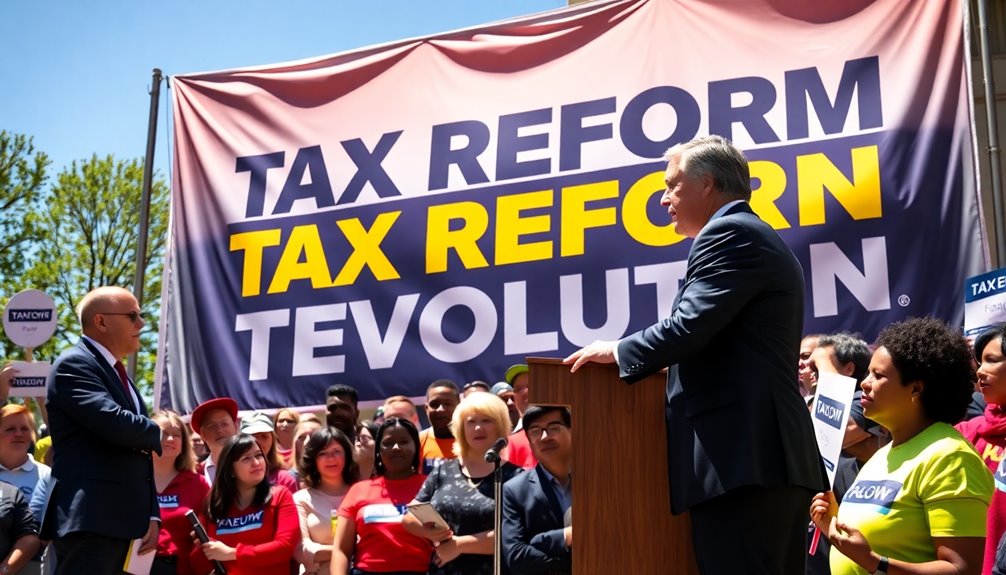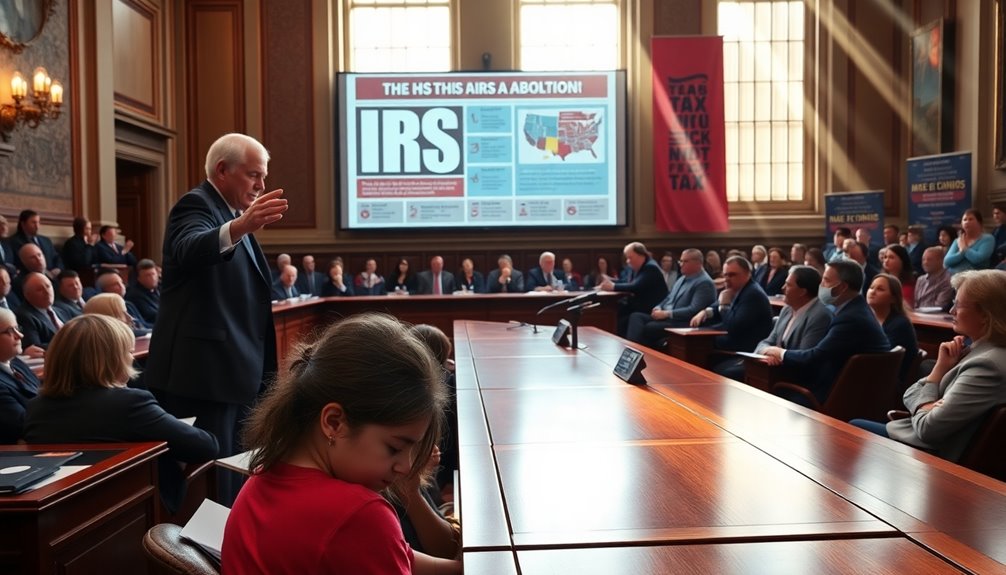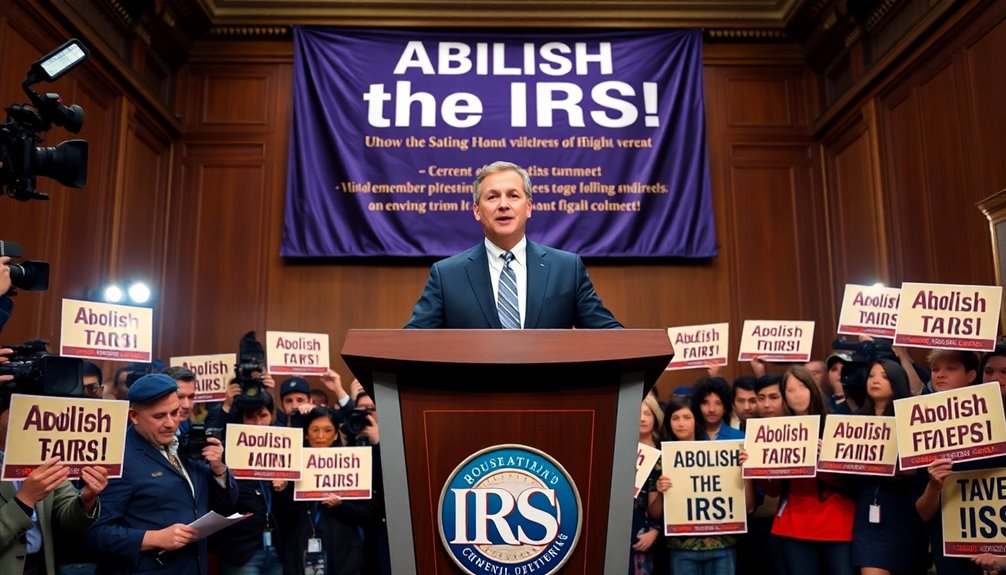A congressman's proposal to abolish the IRS could change your tax experience dramatically. You may find filing simpler, as the plan aims to streamline the tax code and reduce multiple tax brackets to just a few. With increased standard deductions and closed loopholes, you might see fairer taxation. However, this overhaul raises concerns, such as potential errors from less oversight and how it affects lower-income households. If executed, the new system could lower your tax compliance burden, but it also faces mixed public opinions. Explore what this bold move means for your finances in detail.
Key Takeaways
- The proposal aims to streamline tax collection by eliminating the IRS, potentially simplifying the filing process for taxpayers.
- Taxpayers may experience fewer audits and lower risks of fines under the proposed system, promoting a more user-friendly experience.
- Critics express concerns over reduced oversight, which could lead to increased errors in tax collection and compliance.
- The new tax structure may introduce a national sales tax, which could disproportionately affect lower-income households.
- Overall, the plan's implementation timeline is debated, leaving uncertainty about when taxpayers will feel the effects.
Tax Reform Revolution Proposal

As you consider the Tax Reform Revolution Proposal, you'll find that it aims to simplify the tax code dramatically.
It streamlines the filing process, reducing the complexity of tax forms and schedules. By consolidating multiple tax brackets into fewer, simpler ones and increasing the standard deduction, it lessens your taxable income.
The proposal also closes loopholes that benefit only a select few, ensuring fairness. For businesses, it simplifies tax rules, cutting compliance costs. Additionally, this reform could complement state-specific benefits for retirement savings, such as integrating IRAs with state pension plans, enhancing financial security for retirees.
IRS Overhaul Legislation Introduced

The introduction of IRS overhaul legislation has stirred considerable interest and debate among lawmakers and taxpayers alike. This bold proposal aims to eliminate the IRS and explore alternatives for tax collection through private companies.
The plan includes a streamlined tax code, which could simplify your tax filing process and reduce the burden on you. You'll likely see fewer tax audits, lower risks of fines, and improved customer service as a result of these changes.
However, there are concerns about potential errors due to less oversight. As this legislation moves through Congress, public discussions reveal divided opinions, and its timeline for implementation remains uncertain.
The future of your tax experience hangs in the balance.
Economic Growth Projections

While many factors influence the economic landscape, projections for US GDP growth in 2025 indicate a robust rate of 2.5%, surpassing the consensus forecast of 1.9%. This growth is bolstered by a strong labor market, which is expected to stabilize and lower the unemployment rate. However, potential risks loom, especially with large across-the-board tariffs that could greatly impact growth. Additionally, trade policies are expected to have a small net impact on GDP, with potential tariffs causing modest income hits.
Globally, the anticipated GDP growth stands at 2.7%, but the euro area is lagging, projected to expand just 0.8%. With central banks cutting interest rates to normal levels, the overall economic environment appears favorable. Yet, you should stay informed about trade policies as they could alter these projections.
Regulatory Framework Transformation

Recognizing the urgent need for change, the transformation of the regulatory framework is essential to address the challenges facing the U.S. nuclear industry.
The current system is cumbersome, limiting your industry's effectiveness and pushing innovators to seek opportunities abroad. By adopting a risk-informed, outcome-based approach, you can modernize operations and enhance safety. This new framework should balance accountability between the NRC and licensees while ensuring that regulatory agility welcomes advanced technologies. Timely decision-making and a culture shift within organizations will support these goals.
With expert reviews and a refined governance structure, you'll foster a regulatory landscape that prioritizes safety and efficiency, securing the U.S.'s position as a global leader in nuclear innovation. Moreover, leveraging regtech for improved compliance can significantly enhance the effectiveness of the new framework.
Lobbying and Media Coverage

As discussions around abolishing the IRS gain momentum, the role of lobbying and media coverage becomes increasingly significant.
Republican lawmakers rally support for the Fair Tax Act, emphasizing the need for a simpler tax system. This proposal has sparked intense media scrutiny, highlighting concerns about its potential impact on middle-class families and small businesses. Critics argue that a national sales tax could disproportionately burden lower-income households, drawing attention to existing IRS enforcement challenges. With the proposed tax-inclusive rate set at 23% starting in 2027, there are widespread concerns regarding how this change might affect consumer spending and savings.
As the public weighs these perspectives, activist groups blur the lines between charitable work and political lobbying, prompting calls for greater transparency.
Ultimately, how these narratives unfold in the media could shape public perception and influence lawmakers' decisions moving forward.
Taxpayer Compliance Challenges Ahead

Maneuvering the complexities of tax compliance can feel overwhelming, especially with a tax code that's not just outdated but also often confusing.
You face significant challenges, from overly complex laws to high compliance costs. Small businesses and social program recipients are particularly burdened. The lack of competency standards for tax preparers means you're at risk for costly errors, especially if you're low-income. Additionally, delays in processing claims and poor customer service from the IRS can lead to frustration. It's estimated you spend over 7.9 billion hours annually just to comply, costing taxpayers around $546 billion. With a tax gap of $625 billion, the stakes are high, and changes are desperately needed to simplify and improve the system for everyone. Furthermore, ongoing challenges in resolving identity theft victim assistance cases highlight the urgent need for reform.
Frequently Asked Questions
How Will Taxpayers File Their Taxes Under This New Plan?
Under this new plan, you'll file your taxes digitally since the IRS won't handle paper returns anymore.
You'll likely use alternative tax software like FreeTaxUSA or H&R Block to prepare your filings.
For state returns, there's a one-time fee of $14.99.
You'll need to report your purchases and guarantee compliance with the new sales tax system.
Don't forget, eligible taxpayers will receive a monthly rebate to help offset your tax expenses.
What Happens to Current Tax Credits and Deductions?
If you're dreaming of a simpler tax landscape, you might be in for a surprise.
Current tax credits and deductions, like the expanded child tax credit and increased standard deduction, could change dramatically.
If the TCJA expires, you'll see the return of personal exemptions and potentially lower child tax credits.
It's crucial to stay informed, as these shifts can influence your taxable income and overall tax liability considerably.
Will This Plan Affect State Taxes?
Yes, this plan could affect state taxes.
If a national sales tax replaces income taxes, states might shift their revenue strategies. You could see increased sales taxes, impacting your cost of living, especially in states that currently rely on income tax.
States without income tax, like Texas or Florida, might adjust their tax structures to compensate, potentially leading to higher property or sales taxes that directly affect your finances.
How Will Government Services Be Funded Without the IRS?
Imagine a world where tax revenue flows like a river from various streams. Without the IRS, government services could be funded through customs and import duties, work permit fees, and public service charges.
You'd see a national sales tax replacing income taxes, with prebate checks easing the burden.
Additionally, intergovernmental transfers and property taxes would continue to support essential services, ensuring the river of revenue never runs dry.
What Are the Potential Risks of Abolishing the IRS?
Abolishing the IRS carries significant risks that could impact you directly.
You might face higher prices due to a national sales tax, and essential social programs could suffer from reduced funding.
The complexity of implementing a new tax system could lead to administrative challenges, creating confusion and compliance issues.
Additionally, you could see an increased tax burden if the system disproportionately affects low-income and middle-class households, leading to greater economic inequality.
Conclusion
In this thrilling tax reform revolution, you've got a chance to witness a seismic shift in how taxes are handled. Abolishing the IRS could spark significant savings, but it also brings a slew of compliance challenges. As lawmakers lead this legislative leap, staying savvy about changes is essential. With the promise of economic expansion and a transformed regulatory framework, your financial future might just flourish. Keep your eyes peeled; this bold proposal could reshape your tax landscape dramatically!









